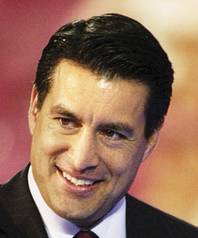Friday, Jan. 15, 2010 | 2 a.m.

Brian Sandoval
Sun archives
- Why Sandoval revealed budget (1-14-2010)
- Governor candidate Brian Sandoval floats budget plan (1-13-2010)
Republican gubernatorial hopeful Brian Sandoval’s plans for filling the state’s budget gap include redirecting proceeds from the Clark County School District’s construction campaign to cover operational expenses.
School District officials say such a move would be a gross breach of trust with voters who approved the bond measure in the belief that the proceeds would be used solely to build campuses and fix older ones.
If the capital dollars were used for other purposes, federal tax penalties likely would be incurred by the individuals, businesses and organizations that invested in the bonds, experts say.
The Internal Revenue Service allows tax-exempt bonds to be sold for a limited number of purposes, school construction among them.
If the Legislature were to order the district to divert construction dollars elsewhere, “it’s likely the IRS would have a problem with that,” said attorney John Swendseid, who serves as bond counsel to the School District. “I’d imagine the bond buyers would also be very unhappy.”
How Sandoval planned to work around the tax status issue wasn’t clear Thursday. A spokeswoman for his campaign said Sandoval thinks there are dollars in the capital fund that could be used without violating the limits attached to bond proceeds.
In 1998 the district expected to raise $3.5 billion over 10 years for 72 new schools. Higher revenue from skyrocketing property values, coupled with better money management, gave the district a larger reserve of funding than had been expected. As a result, the district has built 96 schools and replaced 11 older campuses.
About $1.2 billion is held in the district’s capital reserves. Faced with declining enrollment and a flailing economy, the district last year decided to delay asking voters for additional funding for school construction, and instead is focusing on fixing existing facilities with the money it has.
In his plan to reduce the state’s deficit, Sandoval suggests the $110 million earmarked for class-size reduction in Clark County instead go to the state’s general fund. Tapping into the district’s capital account and using it to pay for operating expenses, salaries and programs would offset the cut.
His proposal would require changing state statute, which limits school districts to selling bonds for campus construction, renovations, replacement and repairs.
The bond money Sandoval is proposing to tap is committed, said Joyce Haldeman, associate superintendent of community and government relations for the Clark County School District. Not all of the projects have gone out to bid yet, but the public’s expectations are locked in, she said.
Sandoval’s plan “would require us to deliver very disappointing news to parents and teachers who are expecting much-needed upgrades to their schools,” Haldeman said.
Additionally, “it would jeopardize our ability to ever pass a future bond issue — because voters do recognize bait-and-switch tactics,” she said. “We’ve worked hard to preserve voter trust. This would disintegrate that.”
However, Patrick Gibbons, education policy analyst for the conservative Nevada Policy Research Institute, said he thinks many voters might actually support the switch.
“Instead of focusing on building more palatial schools that we don’t need at the moment, use the money for programs that might actually benefit and improve student achievement,” Gibbons said. “That would be the smart thing to do.”
Carole Vilardo, president of the Nevada Taxpayers Association, said she hasn’t seen enough detail to judge the relative merits of Sandoval’s proposal, but the summary released thus far does raise plenty of questions.
“Are these dollars that will somehow be paid back?” Vilardo said. “Is it a temporary loan, or something that’s just going to go by the wayside to cover a state shortfall?”
Clark County residents might support Sandoval’s proposal because it appears to fill a fiscal hole without reaching into their individual pockets, Vilardo said.
“Some people are going to be happy that it doesn’t require raising taxes,” she said. “I would think most voters would appreciate that.”
But the School District has contractual obligations with the people, businesses and organizations that bought the bonds, and violating those could mean risking a lawsuit, Vilardo said.
When the bonds were sold, the district essentially promised the buyers that nothing would be done to jeopardize the tax status, said Swendseid, whose firm consults with numerous municipalities on bond-related issues.
But if the Legislature orders those dollars diverted, “I don’t know that the School District can refuse, unless it can show it violates the bonds’ status,” Swendseid said. “I would sincerely hope that no one would ask it to do such a thing.”

Join the Discussion:
Check this out for a full explanation of our conversion to the LiveFyre commenting system and instructions on how to sign up for an account.
Full comments policy